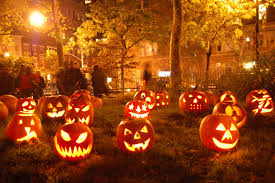 HOW MANY OF YOU OUT THERE KNOW THAT HALLOWEEN
HOW MANY OF YOU OUT THERE KNOW THAT HALLOWEEN
IS ACTUALLY A RELIGOUS HOLIDAY? NONE OF YOU?
WELL MAYBE SOME OF YOU.
By: Edwin L. Crammer CPA Before your little ones go trick or treating next week, why not take them aside and tell them of the real significance of Halloween. Most children as well as their parents have no idea that Halloween has religious roots that go back many centuries. These children will grow up and pass on to their children the idea that Halloween is a fun thing to do on the last day in October and not be able to inform them of the origins of this day.
I am not going to go into great detail on the whole history of Halloween here today as that would take up many pages of which I am not at liberty to do. I will provide you with a shortened version of the story that should provide you with enough information. When you hit the road with your little ones next week, you will do so with this information in the back of your mind.
To understand the origin of Halloween which is actually known by its real name a celebration of the “Feast of all Saints”, Halloween has its roots in the Catholic religion. It is regarded by many people around the world as a Pagan holiday. You can trace the origins of the holiday back to a pre-Christian festival among the Celtic druids who had escaped Church suppression. There are some people today that continue to celebrate the holiday in the tradition of the ancient rituals. They believe that when your children go trick or treating they are in essence worshipping the devil and pagan gods.
The actual idea behind the celebration was that even those sinners who have now passed from this earth and have gone on to damnation need to be remembered. In Ireland where this celebration began it was celebrated by the people banging on pots and pans on “All Hallows Eve” to let the damned know that they were not forgotten.
The tradition of dressing up in fancy clothes on this day did not start in Ireland, but actually it began in France during the 14th and 15th century.
Where did the idea of trick or treating come from? This began with the English Catholics. During the period of the 1500s to the 1700s in England, Catholics had no legal rights.
It was a Capital offense to even say Mass. During this period hundreds of Priests were martyred. Occasionally, there was organized resistance to this ban, often foolishly. One example is what is now celebrated in England each year on November 5th and is called ‘Guy Fawkes Day”. During this period that I discussed above, bands of revelers would go out wearing masks and roused Catholics in the dead of night demanding beer and cakes for their celebration that they called “Trick or Treat”.
When the colonists first settled in America from England they continued to celebrate the tradition of “Guy Fawkes Night” on November 5th but eventually moved it to October 31st.
By the time of the American revolution, and a number of generations had passed, the tradition of “Guy Fawkes Night” had been almost forgotten, but the idea of “Trick or Treat’ was too much fun to give up.
By the early 1800s the fixture known as Halloween had been passed down to the many cultures of immigrants that settled in our land and thus became an annual fixture that is still celebrated today.
But how did witches become part of this holiday. As you can see from the origins of this holiday, there was nothing mentioned about witches in all of the incarnations that took place over the many years this holiday evolved. Believe it or not, the addition of witches to the celebration of Halloween originated with the greeting card industry. The theory was that Halloween was already a ghoulish holiday, so why not dress up and add interest to the holiday by adding witches to the mix. Later in order to make the holiday more interesting Pumpkins and Jack O’ lanterns were added.
If after reading this article you wish to impart a religious feeling to your children as they arrive home with their basket of goodies that they had coerced their neighbors into giving them, have them thank God for the bounty they have just received.
This article has been adapted from an article written by Father Augustine Thompson Professor of Religious studies at the University of Virginia. The complete article written by Father Thompson is much longer than my adaption. If the reader wishes to read the article in its entirety, it can be found online.
Contact: Edwin L. Crammer at: Ed@Eyeonsouthflorida.com






















